Did you know that CBD, a compound found in marijuana, is now legal at the federal level in the United States? This change has sparked a lot of interest. Consumers, healthcare professionals, and entrepreneurs are all paying attention. It’s important to understand CBD laws, regulations, and where products come from.
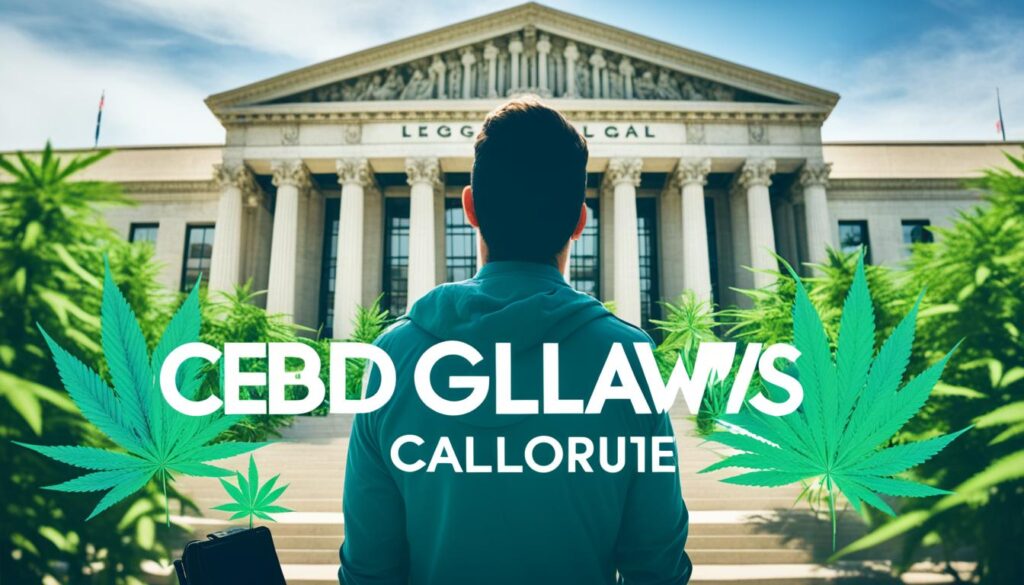
The legality of CBD can change depending on where you are. This article will help you understand the legal aspects of CBD. We’ll talk about its effects on health, possible risks, and how the FDA is involved. We will also cover the issues with misleading marketing and what to consider for safety.
If you use CBD, are thinking about it, or just want to know the legal details, this guide is for you. It will give you the information needed to understand CBD legality and regulation.
Key Takeaways:
- CBD derived from hemp is legal at the federal level in the United States, but its legality may vary at the state level.
- The FDA has approved a CBD-based medicine for rare seizure disorders, but the safety and efficacy of other CBD products are not well-known.
- Using CBD products can have potential risks, including contamination and misleading product labeling.
- The FDA plays a significant role in regulating CBD products and has taken enforcement actions against companies making unsupported claims about CBD.
- Consumers should prioritize safety and quality when choosing CBD products, purchasing from trusted sources, and seeking third-party testing and certification.
The Science Behind CBD and Its Effects on Health
Scientists are digging into how CBD affects health. A big leap was made when the FDA okayed Epidiolex. This drug, containing CBD, targets rare seizure disorders.
There’s a catch with other CBD products, though. They lack extensive data on their effects. Always talk to doctors before trying CBD in your daily life.
“The safety of CBD products and their potential side effects are not well-known due to limited data.”
CBD might have side effects like hurting the liver or mixing badly with other meds. Feeling sleepy, mood swings, and stomach issues can also happen. The impact varies by dose and personal health.
Using CBD when pregnant is a no-go because it could harm the baby. Plus, we don’t know if CBD ends up in breast milk.
Scientific Research and CBD’s Health Benefits
Research into CBD’s health perks is just starting. Some studies hint at its healing powers for various issues. Yet, we need more evidence to be sure of its benefits and safety.
“Scientific research on CBD’s potential health benefits is still in its early stages.”
People are looking at CBD for chronic pain, anxiety, epilepsy, and sleep troubles. But, take these claims with a grain of salt. More solid proof is needed. Never use CBD without a doctor’s advice.
Epidiolex: A Breakthrough in CBD Medicine
The FDA-approved drug Epidiolex has brought new hope. It’s a CBD medication tackling rare seizure disorders. It has given hope to many suffering families.
The Risks and Unknowns of CBD
Using CBD products comes with potential risks and uncertainties. Cannabidiol (CBD) is gaining popularity for its potential benefits. However, there are important considerations to keep in mind.
Unintentional Poisoning and Product Labeling
One risk of using CBD is accidental poisoning. It’s important to not confuse CBD with THC products. THC can cause adverse and psychoactive effects.
It’s also crucial to know that most CBD products are not FDA regulated. This means they might contain harmful substances like THC, pesticides, or bacteria.
Table: Risks of CBD Products
| Risks | Examples |
|---|---|
| Unintentional Poisoning | Consuming CBD products with high levels of THC |
| Product Labeling | Misleading or inaccurate labeling of CBD content |
| Synthetic CBD Derivatives | Unknown effects of synthetic CBD derivatives |
Long-Term Effects and Modes of Use
The long-term effects of CBD use are still uncertain. Data on the prolonged use of CBD and its impact is limited. Research is ongoing to fully understand potential risks and benefits.
Different ways of using CBD, like smoking or eating, carry various risks. The safety of these methods is still unknown.
Synthetic CBD Derivatives
There’s concern about synthetic CBD, such as Delta-8 THC. These can be psychoactive and might not be properly labeled. Consumers should be aware of the risks these compounds pose.
Image:

As the CBD market grows, consumer safety must be a priority. Being mindful of labeling, understanding CBD use modes, and being aware of risks is key. This will help consumers navigate the CBD world safely.
Next: Section 4: FDA’s Role in Regulating CBD
FDA’s Role in Regulating CBD
The U.S. Food and Drug Administration (FDA) has a big job. It regulates CBD products to keep us safe. CBD from hemp is legal in the U.S.
But the FDA still has the power to check these products. This is because of the Federal Food, Drug, and Cosmetic (FD&C) Act and the Public Health Service Act.
So far, only one CBD medicine has FDA approval. It’s called Epidiolex. This medicine helps with some rare kinds of seizures.
Other CBD items aren’t approved yet. So, it’s smart to think about possible risks and side effects.
The FDA has warned companies that say CBD can do things without proof. The FDA also says not to use CBD for health issues without their approval. Why? Because these products might not be tested well.
“The FDA checks medical products carefully, and CBD is no different. Be careful of companies claiming CBD has health benefits without proof.”
The FDA also looks at CBD in food and supplements. They’ve made rules to help make sure these CBD products are safe and good. They focus on how to label them right, how they’re made, and quality checks.
To help keep us safe, the FDA has made a guide for research on CBD. This guide helps researchers do studies that are up to scientific standards. This way, we can learn more about CBD and its possible good effects.
FDA Regulations for CBD
| FDA Regulation | Description |
|---|---|
| FDA-approved CBD products | Epidiolex, a CBD-based medicine, approved for specific rare seizure disorders. |
| FDA warnings on CBD | Issued to companies making unsubstantiated claims about CBD products. |
| FDA regulation of CBD in food and supplements | Guidance issued to ensure quality, safety, and efficacy of CBD products in these categories. |
The FDA’s work in CBD regulation helps keep us safe. It’s key for companies and us as consumers to know what the FDA says. This way, we can make smart choices about CBD products.
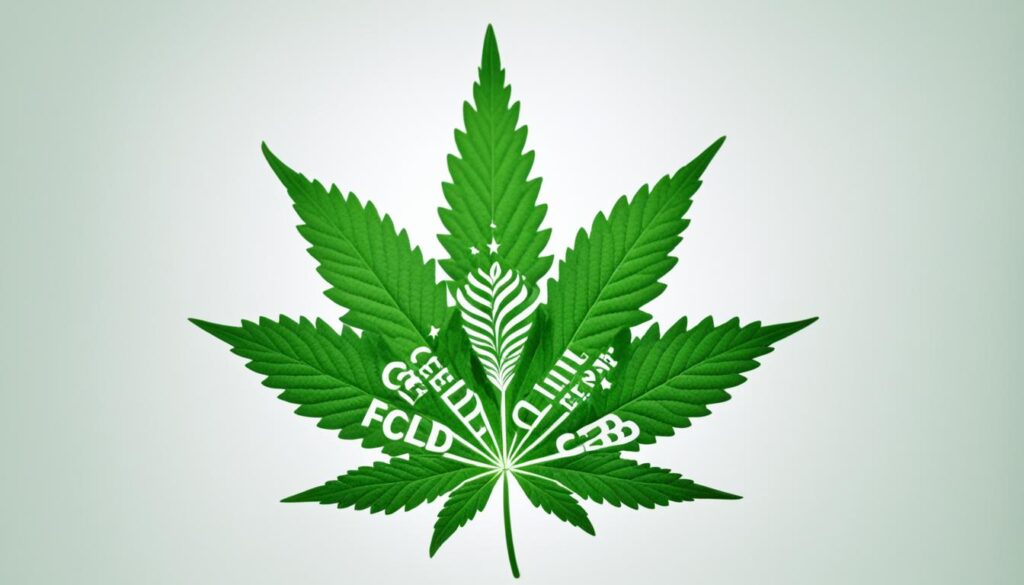
Misleading Marketing and Consumer Awareness
CBD products have a lot of misleading marketing. Companies often claim their CBD has medical benefits without the science to back it up. It’s key for shoppers to check the quality and safety of these products. This is because the FDA doesn’t fully regulate them.
The accuracy of what’s on CBD labels is worrying. Products might not list everything in them. They also could have varying amounts of CBD and THC. THC is the part of cannabis that affects your mind. This uncertainty is risky for people who need to know exactly what they’re taking.
The FDA tries to help by giving out info on the possible risks and benefits of CBD. They urge everyone to talk to healthcare experts before trying CBD in their health routines. This advice helps people choose safely and wisely for their health.
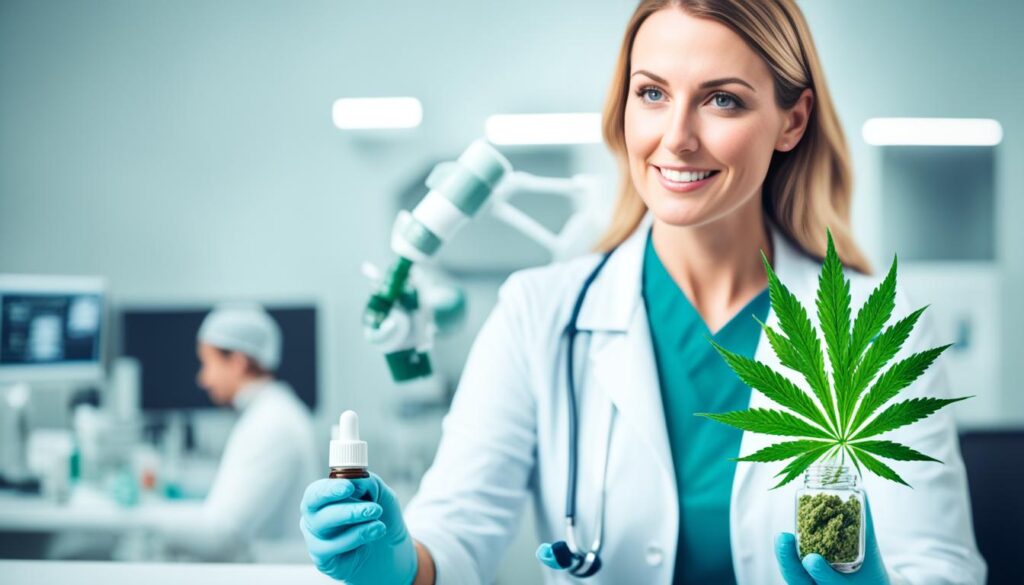
FDA’s Stance on Cannabis and CBD Research
The FDA sees the need for more studies on CBD’s real benefits. It is aware of the rising interest in these products. At the same time, it worries about their safety and how they are used by certain groups.
“The FDA is committed to supporting rigorous clinical investigation of cannabis and its components, such as CBD,” said Dr. Janet Woodcock, the FDA’s Acting Commissioner. “We need reliable data to evaluate the risks and benefits of these products.”
The agency is especially concerned about cannabis products being used by specific groups. This includes kids, pregnant and breastfeeding women, and people with certain health issues. More research is needed to understand the risks and benefits for these groups.
Even with these concerns, the FDA sees the potential benefits of cannabis and CBD. It allows for research studies and programs that give patients access to these products for medical reasons. But, it underscores the need for proper research to guarantee their safety and effectiveness.
Moreover, the FDA supports actions that allow more access to cannabis products for medical use. This helps patients who have no other treatment options to consider new therapies. It ensures there is enough oversight and monitoring.
Facilitating Clinical Investigations
The FDA plays a key role in supporting cannabis research. Due to the increased demand for studies, the agency has created a support system for clinical trials. This helps to better understand the possible benefits and risks of cannabis and its products.
By working together with others in industry, academia, and more, the FDA helps to promote studies that provide reliable data. These studies are important for making future decisions and ensuring the safe use of cannabis and CBD products.
The agency’s effort to encourage research on cannabis and CBD shows its commitment to making decisions based on evidence. Through promoting science and thorough research, it aims to uncover the true benefits of cannabis and CBD. This helps provide patients with trustworthy and accurate information.
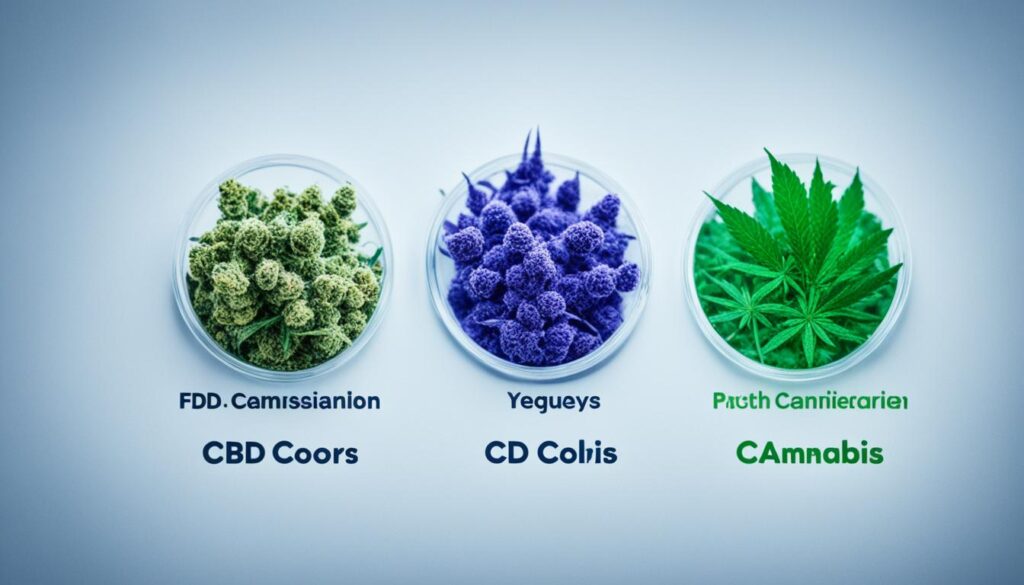
The FDA is key in regulating CBD products to keep consumers safe and protect public health. When companies break FDA rules, the agency acts. It sends out warning letters to fix these breaches.
The FDA has warned companies that sell CBD illegally, especially those falsely claiming CBD can cure diseases. These steps stop false claims and keep consumers safe from bad products.
In responding to public petitions about CBD and dietary supplements, the FDA listens to people’s concerns. This helps the agency better understand how the public feels about CBD’s rules and use.
The FDA also makes sure CBD in cosmetics is safe. It guides how to include cannabis parts in cosmetics so they meet safety and labeling rules.
“The FDA actively enforces rules and responds to violations in the CBD world. By issuing warnings and looking into citizen petitions, the agency strives to keep consumers safe and ensure companies follow FDA rules.”
Overall, the FDA’s actions and warnings help make the CBD market clearer and safer for everyone.
FDA Enforcement Actions and Warnings
| Date | Actions Taken |
|---|---|
| August 2020 | Issued warning letters to companies selling CBD products with unsubstantiated claims. |
| March 2021 | Responded to citizen petitions related to CBD and dietary supplements, gathering input from the public. |
| October 2021 | Provided guidance on the use of CBD in cosmetic products, ensuring compliance with safety standards and labeling requirements. |
The FDA works hard to regulate and correct violations, making the CBD market safer and more reliable for buyers.
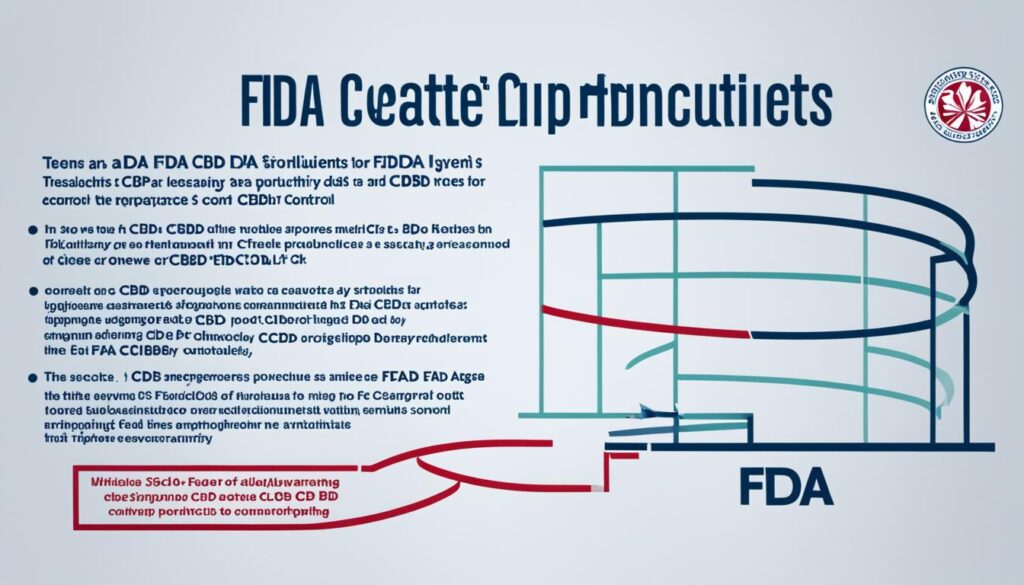
FDA’s Engagement with Industry and Stakeholders
The U.S. Food and Drug Administration (FDA) works closely with the cannabis industry and others involved. It does this to make sure cannabis products, including CBD ones, are safe and high quality. The FDA knows how important it is to work together and listen to different voices in this fast-growing field.
FDA’s Approach to Cannabis Regulation:
The FDA aims to protect public health while also giving clarity to the market. It sees the potential health benefits of cannabis. The FDA is researching to better understand how it can be used in medicine and what the risks might be.
FDA’s Role in Hemp Production and 2018 Farm Bill:
After the 2018 Farm Bill was passed, the FDA’s role in regulating hemp became more pivotal. The FDA makes sure products from hemp, like CBD, follow federal laws. The FDA shared its views on hemp production and its duties in regulating it with Congress.
FDA Priorities for Cannabis-Containing Products:
The FDA focuses closely on cannabis products, including those with CBD. It wants to check their safety, how well they work, and their quality. The agency looks at how these products could be regulated. It keeps an eye on scientific studies and what stakeholders say.
“The FDA is committed to engaging with industry and stakeholders to foster a collaborative approach to cannabis regulation. By working together, we can create a regulatory framework that ensures the safety and quality of cannabis-containing products while promoting innovation and consumer access.”

The FDA also shares its views at conferences and webinars. This is to explain its strategy on cannabis science, policy, and regulation. These actions help make sure that the public and those with a stake in the matter know about the FDA’s role.
The FDA continuing to work with the cannabis industry and others is key. It helps build a strong regulatory system that tackles the unique challenges of the cannabis industry. Through cooperation, the FDA and stakeholders aim to protect public health. At the same time, they want to encourage innovation and responsible use of cannabis products.
Safety Considerations and Contaminant Risks
Consumer safety is top priority with CBD products. It’s vital to know the risks and take steps for safety. A major issue is contaminants in CBD products, like heavy metals and pesticides. Without proper checks, these can harm health.
The FDA has raised safety and quality concerns about CBD. To avoid risks, consumers should pick CBD from trusted sources. These sources ensure quality and conduct rigorous tests.
“Ensuring the purity and safety of CBD products is crucial. Reputable manufacturers prioritize quality control measures and rigorous testing procedures to minimize the presence of contaminants.” – Dr. Jane Johnson, CBD Researcher
Quality CBD manufacturers do extensive testing. They check for heavy metals, pesticides, and more. This ensures their products are safe and high-quality. Choosing trusted CBD products gives consumers confidence in safety and quality.
However, the FDA doesn’t fully regulate CBD products yet. This means some market products may not be as thoroughly tested. Consumers should be careful and choose trustworthy brands.
Potential CBD Contaminants and Associated Risks
| Contaminant | Associated Risks |
|---|---|
| Heavy Metals (e.g., lead, arsenic) | Can lead to toxic effects and various health issues |
| Pesticides | Pose potential human health risks over long periods |
Knowing the risks and contaminants in CBD products helps consumers make safe choices. Always talk to a healthcare expert about CBD, especially with health concerns or medication questions. Safety and quality in CBD should always come first.
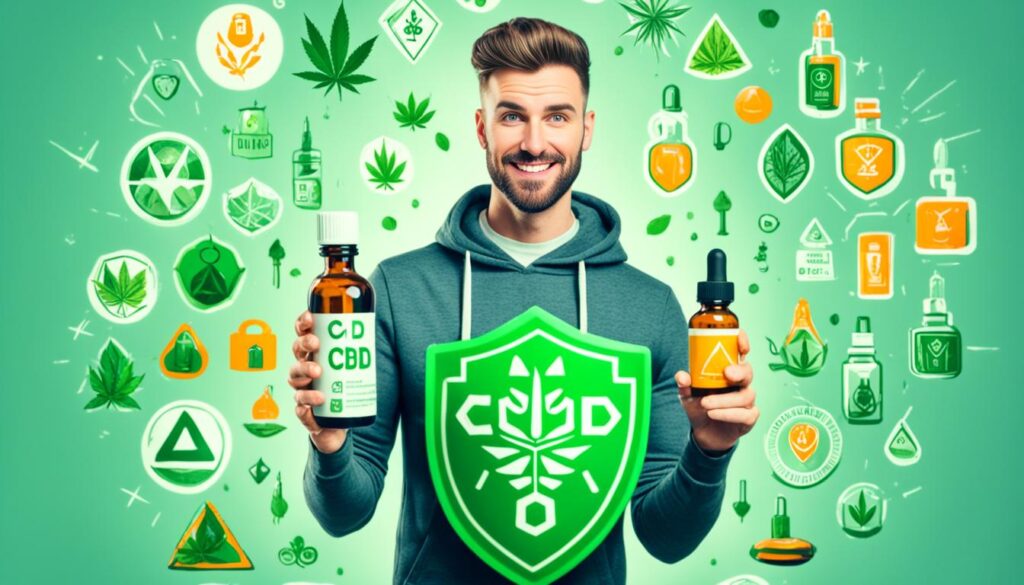
Current Legal Landscape and Future Regulations
The legal field around CBD is complex and changes a lot. CBD from hemp is legal in the whole country. But, each state can have its own rules.
Some states accept the federal law about hemp. This lets them sell and use CBD legally. Yet, some states still see hemp as illegal. This makes CBD’s legal status vary.
The future might bring more rules from the federal level. This aims to make sure CBD products are safe and effective. As more people get interested in CBD, clear rules are needed. They help protect buyers and ensure companies are open about what they offer.
It’s key for buyers to know their state’s CBD laws. They should learn what’s legal, especially about THC levels. Also, they need to know about labels and tests for CBD goods.
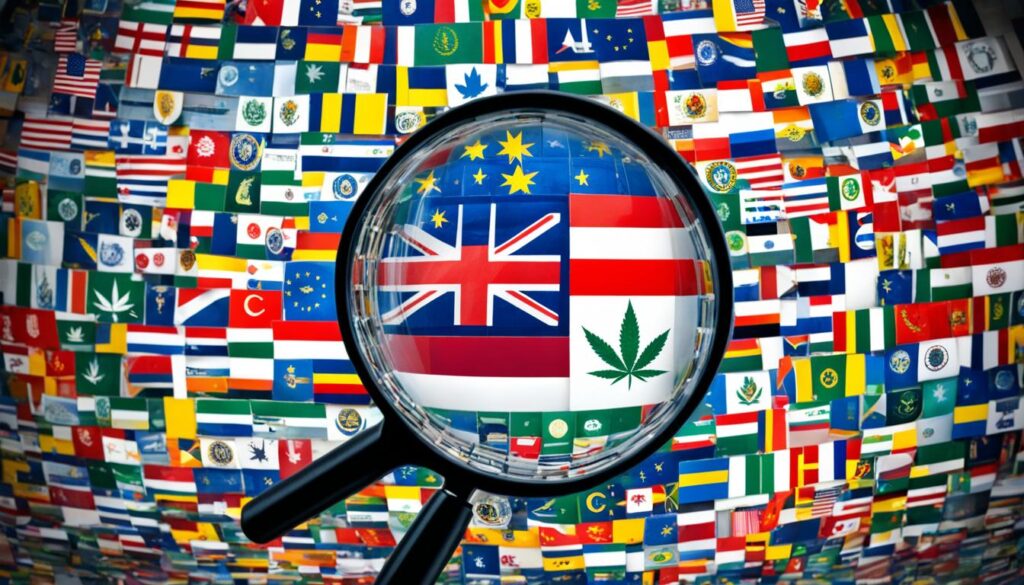
Being aware and knowledgeable helps buyers choose wisely. This is about buying and using CBD items carefully.
Buyer Beware: Ensuring Quality and Legitimacy of CBD Products
The CBD market lacks FDA oversight, leading to potential mislabeling and contamination. Consumers should be cautious and focus on the quality and legitimacy of their CBD products. With many options available, it’s vital to make informed choices.
Considering the CBD product sourcing is crucial. It’s best to select products from trusted manufacturers and retailers. Look for reputable companies that follow high standards and have an open supply chain. Research and choose trusted sources known for safe and dependable products.
Attention to the CBD product labeling is also important. Look for products that clearly state the CBD content and other ingredients. Transparent labeling helps you know what you’re taking, so you can choose wisely based on your needs and likes. Avoid products with unclear or misleading labels, and pick those with detailed information.
Regarding CBD product quality assurance, choosing tested and certified products is key. This testing checks if the products have the right amount of CBD and are free from harmful stuff. Opt for CBD items that share their lab results, adding trust in their quality.
“It is advisable to purchase CBD products from trusted sources that provide transparent labeling and have quality assurance measures in place.”
To safely navigate the CBD market, take the right steps. Opting for trusted CBD sources, careful labeling reviews, and confirming product quality are crucial. These steps ensure a positive CBD experience.
Below is a table showing the difference between CBD products from trusted and non-trusted sources:
| Trusted CBD Product Sources | Non-Trusted CBD Product Sources | |
|---|---|---|
| Reliable Sourcing | Products sourced from reputable manufacturers and retailers known for their quality commitment. | Unclear sourcing, possibly from unknown or unreliable suppliers. |
| Transparency in Labeling | Products with clear labeling, showing detailed CBD content and ingredient information. | Vague or misleading labeling, complicating the understanding of CBD content and other ingredients. |
| Quality Assurance | Products verified by third-party tests, ensuring authenticity and purity. | Quality unverified, raising the risk of contaminants or incorrect CBD levels. |
Choosing trusted sources for CBD products means peace of mind with safe, reliable, and high-quality options.
Next, we will look at how the FDA is key in regulating CBD products and keeping consumers safe.
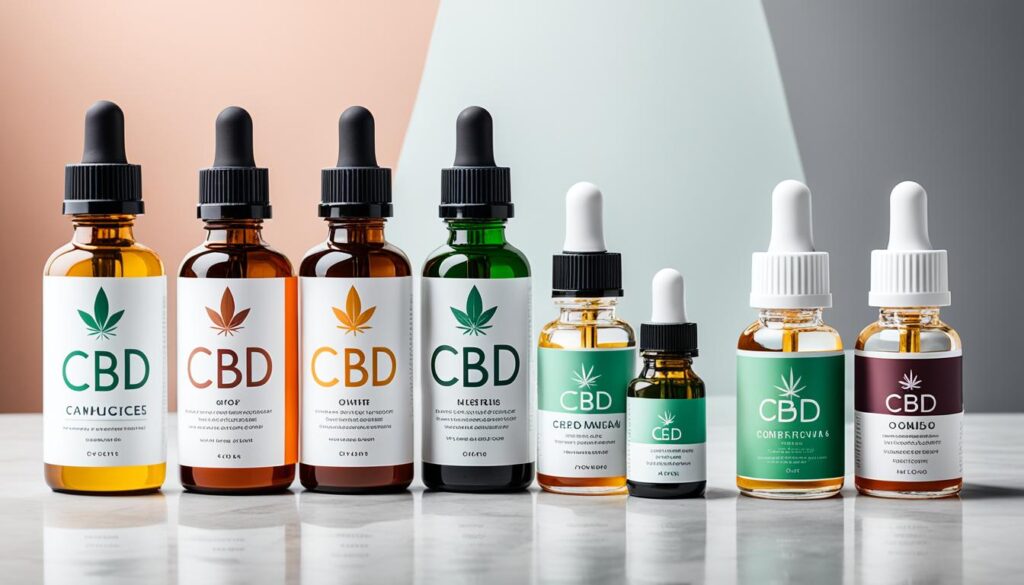
Conclusion: Navigating the Complexities of CBD Legality and Regulation
Understanding CBD legality and regulation changes can feel overwhelming. This is due to different laws at federal and state levels. As a consumer, knowing the science, risks, and FDA regulations about CBD is vital. This knowledge lets you make smart choices about CBD products.
When buying CBD, focus on safety and quality first. Only buy from trusted sources that value clarity and provide clear labeling. Many trusted sellers do third-party tests and have checks to ensure their CBD is real and pure.
Talking to healthcare providers can also help, especially if you have health issues or take other medications. They can advise you on the best CBD products and dosages for you.
The world of CBD law and rules keeps changing. So, staying updated is key. Follow the latest news and changes in laws in your area. This way, you can use CBD safely and legally while exploring its benefits.